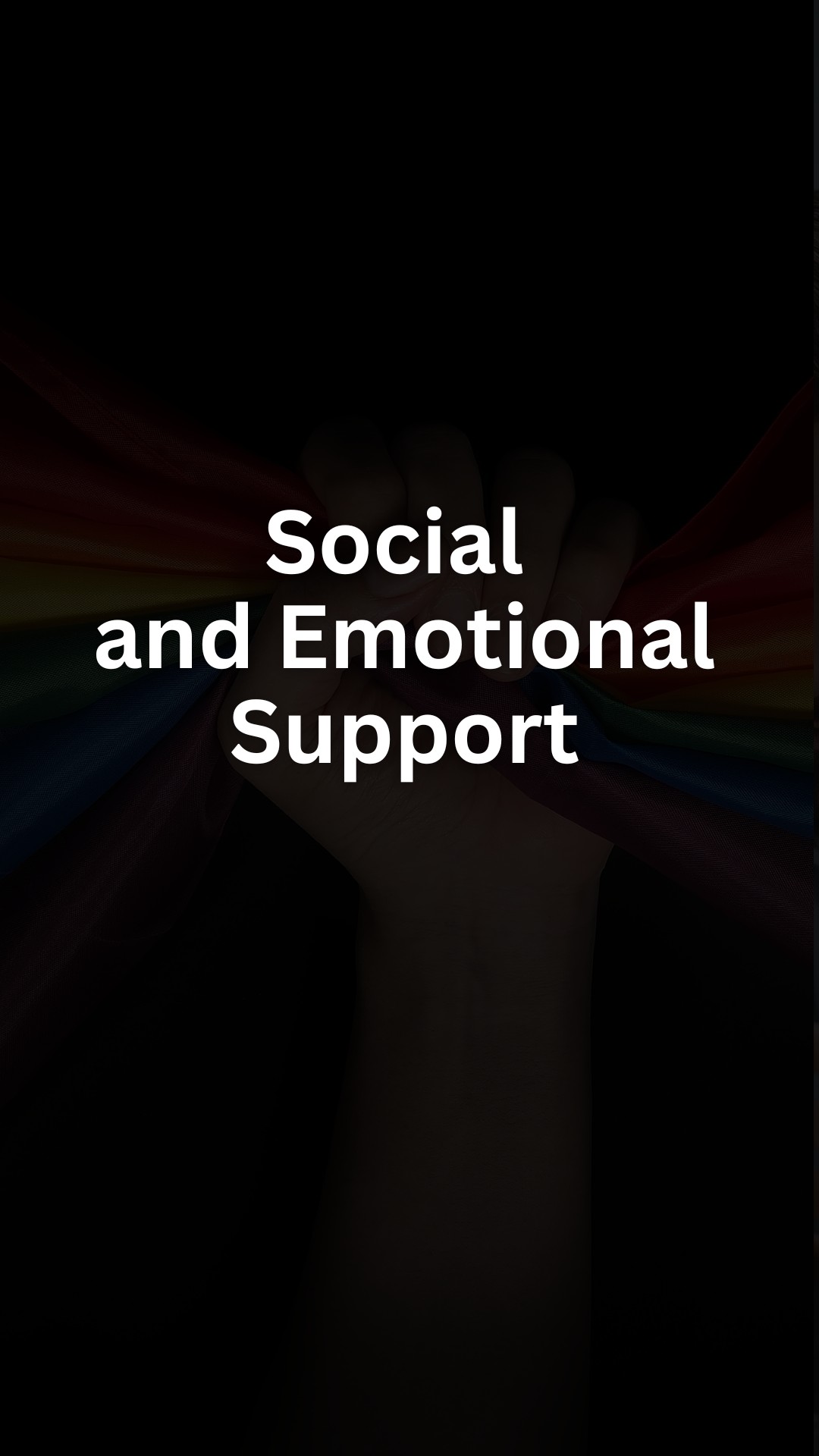Divorce is never easy, but for LGBTQ+ couples, it can come with unique challenges.
Navigating divorce means understanding the legal and emotional aspects that specifically affect LGBTQ+ relationships.
You may face issues around custody agreements or property rights that are different from those encountered by heterosexual couples.
Knowing what to expect can help you manage these challenges more effectively.
Communication and support are crucial during this time.
You might need to find a lawyer who is experienced with LGBTQ+ issues or seek support from friends and community groups.
This can make the process less overwhelming and help you feel more understood and supported.
It’s also important to focus on self-care.
Going through a divorce is stressful, and taking care of your mental and emotional well-being is vital.
This might include finding a therapist who can help you work through the personal challenges you’re facing.
Remember, you don’t have to go through this alone.
Understanding the Legal Landscape

Navigating divorce as an LGBTQ+ couple requires knowing how laws recognize marriages and the unique issues faced in different states.
Being informed can help you better prepare for the legal process ahead.
Recognition of LGBTQ+ Marriages
LGBTQ+ marriages are legally recognized across the United States.
Following the 2015 Supreme Court decision in Obergefell v. Hodges, same-sex couples gained the right to marry nationwide.
This means that, legally, your marriage is valid and must be treated the same as heterosexual marriages.
When it comes to divorce, the process should follow the same legal procedures.
This includes equitable distribution of assets, potential alimony, and child custody considerations if applicable.
Knowing that your marriage has equal standing can provide some assurance during the legal proceedings.
State-Specific Laws and Considerations
Despite the nationwide recognition of LGBTQ+ marriages, each state can have different laws regarding divorce.
Some states may have specific residency requirements or waiting periods. Others might approach matters like alimony or custody differently.
For instance, states like California and New York tend to have more progressive laws supporting LGBTQ+ rights.
On the other hand, states with fewer protections may present additional challenges.
Researching your state’s specific laws or consulting with a lawyer who specializes in LGBTQ+ family law can be invaluable.
Understanding these state-by-state differences ensures you’re well-prepared and aware of any additional steps you might need to take.
This knowledge can help make the legal process smoother and less stressful.
Initiating the Divorce Process

You need to understand the steps to begin a divorce when you’re part of an LGBTQ+ couple.
Knowing how to file for divorce, selecting an attorney, and exploring alternative dispute resolution options is vital.
Filing for Divorce
First, gather all necessary documents, including identification, marriage certificates, and financial records.
Next, you file a petition for divorce at your local courthouse. This petition will list your names, the date of marriage, and any children or property involved.
Each state has different requirements, so it’s helpful to check local laws. Some areas may require a waiting period.
Make sure you provide accurate information to avoid delays in the process. You can find forms online or at the courthouse.
After filing, serve your partner with the divorce papers.
This involves delivering the documents through a legal method, usually via a process server or certified mail. Your partner then has a set time to respond.
Choosing the Right Attorney
Finding the right attorney is crucial.
Look for an attorney with experience in LGBTQ+ divorce cases as they will understand the specific challenges that may arise.
Personal referrals, LGBTQ+ support groups, or legal directories can be good resources for recommendations.
Schedule consultations with a few attorneys to compare their approaches.
Ask about their experience, fees, and if they have handled cases similar to yours.
This helps you gauge their expertise and whether you feel comfortable working with them.
Consider the cost, which can vary widely. Some attorneys charge a flat fee, while others bill hourly.
Make sure you clearly understand this before hiring anyone.
Feel confident that your attorney will advocate for your rights throughout the process.
Alternative Dispute Resolution Options
Alternative dispute resolution (ADR) includes mediation and collaborative divorce. These methods can be less adversarial and more private than going to court. They might save you time and money while reducing stress.
Mediation involves a neutral third party who helps you and your partner negotiate terms.
This can include dividing property, agreeing on alimony, and making arrangements for any children involved.
The mediator doesn’t make decisions but helps facilitate a fair agreement.
Collaborative divorce allows both parties to work with their attorneys to resolve issues without court.
This voluntary process relies on open communication and cooperation.
If you choose ADR, make sure both you and your partner are willing to participate in good faith.
Considering Children in the Divorce

Divorce can be especially complex for LGBTQ+ couples with children. It’s important to focus on custody arrangements and understanding legal issues related to adoption and parentage.
Custody and Visitation Rights
Both parents should strive for a custody arrangement that supports the best interests of their child.
Courts use several factors to decide custody:
- Child’s best interests: Assessing who can provide a stable environment.
- Parental involvement: Each parent’s involvement in daily activities.
- Child’s preference: The child’s wishes, especially if they are older.
Visitation rights are crucial if one parent doesn’t get custody.
Families should create a clear schedule for visitation. Flexibility and cooperation between parents can help maintain a nurturing relationship.
Adoption and Parentage Issues
Legal recognition of both parents is essential.
This can be complicated if only one parent is biologically related. In some cases, the non-biological parent may need to adopt the child formally.
Types of adoption include:
- Joint adoption: Both parents adopt together.
- Second-parent adoption: The non-biological parent adopts the child while the biological parent’s rights remain.
It’s important to check state-specific laws, as they differ significantly.
Ensure all legal steps are taken to protect both the child and the parent’s rights.
Division of Assets and Finances

When going through a divorce, distributing property and determining financial responsibilities like alimony and child support can be complex, especially for LGBTQ+ couples. Knowing how assets will be divided and what financial support is required helps make the process smoother.
Property Division
Property division involves splitting everything you and your partner own. This includes homes, cars, furniture, and bank accounts.
In some areas, laws may favor community property, meaning all property and money acquired during the marriage is split equally.
If you live in a common law state, property is divided more based on who owns it.
Be prepared with documentation to show who bought what. Consider hiring a lawyer familiar with LGBTQ+ issues to ensure fair treatment.
Think about pre-marital agreements and how they impact property division.
This can protect assets you owned before getting married. Make a list of everything you own together for a clear understanding of what needs to be split.
Alimony and Child Support
Alimony is financial support paid to a spouse after divorce.
The length of your marriage, your income levels, and living standards during the marriage all affect alimony decisions.
Child support is another key factor, and it’s calculated based on state guidelines.
These usually consider both parents’ incomes and the needs of the child.
For LGBTQ+ couples, legal parentage can affect child support.
Ensure both parties agree on custody and visitation to determine fair support.
If you adopted children together or have children from previous relationships, discuss what financial support is necessary.
Working with a mediator can provide impartial guidance. Understanding your financial obligations helps you plan better for life post-divorce.
Addressing Tax Implications

Navigating the tax implications of divorce can be complex. Key areas to consider include changes in your filing status and how alimony payments are treated for tax purposes.
Filing Status Changes
When you get divorced, your filing status changes.
This change affects your tax bracket and the amount of taxes you owe.
If you are single by December 31 of the tax year, you can no longer file as married.
Your new status could be “Single” or “Head of Household” if you have dependents.
Head of Household status offers better tax rates and benefits.
Keep in mind, you must meet specific requirements to qualify for this status. Always check the latest IRS rules to ensure compliance.
It’s important to adjust your tax withholding at work.
You might need to fill out a new W-4 form to reflect your new status. This helps to avoid owing a large sum when you file your taxes.
Tax Treatment of Alimony Payments
Alimony payments have specific tax rules.
If you receive alimony, it is not taxable income. If you pay alimony, it is not deductible.
These rules changed with the Tax Cuts and Jobs Act of 2017, effective for divorces finalized after December 31, 2018.
It’s crucial to clearly define alimony in your divorce agreement.
Make sure it complies with IRS guidelines.
Payments must be in cash or equivalents, and cannot be categorized as child support or property settlement.
Proper documentation is essential.
Both parties should keep records of payments and terms agreed upon.
This helps to avoid disputes and provides proof to the IRS if needed.
Always stay informed on IRS updates regarding alimony to ensure you handle it correctly on your taxes.
Healthcare and Insurance Considerations

When going through a divorce, healthcare and insurance concerns are crucial.
Health insurance policies can change significantly. If you were on your partner’s plan, you might need to find new coverage.
Consider exploring options like the Affordable Care Act, Medicaid, or job-based insurance.
Prescription medications also matter.
Ensure you have enough medication during this transition.
Check if your new insurance will cover your prescriptions. If not, you might need a letter from your doctor or consider switching medications.
Look into mental health support.
Divorce can be stressful, and having access to therapy or counseling can help.
Many insurance plans cover mental health services. Verify what your new plan includes.
Transgender and non-binary individuals have specific needs.
Check if the new insurance covers hormone therapy and gender-affirming surgeries. Contact your new insurer to confirm these details.
Below is a simple comparison table for clarity:
| Aspect | Checklist |
|---|---|
| Health Insurance | Affordable Care Act, Medicaid, Job-based |
| Prescription Medications | Coverage, Doctor’s letter |
| Mental Health Support | Therapy, Counseling |
| Transgender Healthcare | Hormone therapy, Gender-affirming surgeries |
Social and Emotional Support

Finding social and emotional support during a divorce is crucial. LGBTQ+ support networks and counseling can provide you with needed guidance and encouragement.
LGBTQ+ Support Networks
LGBTQ+ support networks connect you with people who understand your situation.
These networks can be online or in-person. They offer safe spaces to share experiences, receive advice, and find friends who get what you’re going through.
Local LGBTQ+ community centers often have support groups.
These groups can discuss various topics, including relationships and legal advice, and provide a sense of belonging.
Online forums and social media groups also offer a space where you can ask questions and share stories in a non-judgmental environment.
Support networks can also help you find resources.
They can direct you to professionals who specialize in LGBTQ+ issues, such as lawyers and therapists, ensuring you get the right help.
Counseling for Individuals and Couples
Counseling is another valuable resource during a divorce.
Individual counseling helps you process your emotions. A therapist can help you deal with feelings like anger, sadness, and fear. They can also help boost your self-esteem and provide coping strategies.
Couples counseling can be helpful even if separation is inevitable.
A counselor helps facilitate open communication, allowing both partners to express their feelings and needs. This can make the divorce process less adversarial and more collaborative.
If you have children, counseling can aid in co-parenting strategies.
Therapists can work with you and your ex-partner to develop a plan that prioritizes your children’s well-being, making the transition smoother for them.
Navigating Name and Identity Changes

When going through a divorce, you might decide to change your name or update your identity.
Legal Name Changes
- Legal Name Change Petition:
- You should file a petition in court.
- Then, provide required documents like a birth certificate and ID.
- Court Hearing:
- Next, attend the court hearing.
- During the hearing, you need to provide reasons for the name change.
Updating Documents
Start with your Social Security card.
Contact the Social Security Administration to update your name.
Next, update your driver’s license or state ID.
Visit your local DMV and bring your new Social Security card and court order.
Informing Others
Notify employers, banks, and utility companies of your new name.
You can use a template letter to make this process easier.
Identity and Pronoun Changes
Changing your identity can also mean changing names, pronouns, or gender markers.
- Workplaces:
- Discuss your new name and pronouns with HR.
- Then, update your email and nameplate.
- Schools:
- Inform the school administration.
- Then, update records and ID cards.
Emotional Support
Seek help from friends, family, or therapists. It can be an emotional journey, but you don’t have to do it alone.
Resources
- Local LGBTQ+ Centers: Offer guidance and support.
- Online Forums and Groups: Share experiences and advice.
Post-Divorce Life Planning

After a divorce, it’s important to focus on updating legal documents and planning your finances for the long term. This ensures that your new life runs smoothly and that you’re prepared for the future.
Updating Legal Documents
You should update your will, power of attorney, and any other legal documents. This is crucial to ensure your wishes are honored.
Notify your lawyer to help with the changes.
Also, update your beneficiaries on insurance policies and retirement accounts.
Go through important documents and make sure the correct people are listed.
Tips for updating legal documents:
- Review and rewrite your will.
- Change beneficiaries on life insurance and pensions.
- Update your power of attorney and health directives.
Long-Term Financial Planning
Think about your financial future now that your circumstances have changed.
Create a budget that fits your new lifestyle. Make sure to adjust your savings goals.
Meet with a financial advisor if possible.
Steps for effective financial planning:
- Create a manageable budget.
- Set new savings goals.
- Review retirement plans and adjust if needed.
- Consult a financial expert for tailored advice.
Protecting Privacy and Security

When navigating divorce as an LGBTQ+ couple, protecting your privacy and security is crucial. Below are some tips to help you stay safe and secure.
1. Protect Personal Information
- Change passwords for all your accounts.
- Use strong, unique passwords.
- Consider using a password manager.
2. Check Social Media Settings
- Review privacy settings on all platforms.
- Limit who can see your posts and personal information.
- Be cautious about sharing your location or private details.
3. Secure Communication Channels
- Use encrypted messaging apps like Signal or WhatsApp.
- Avoid using shared devices for private conversations.
- Consider creating new email addresses for sensitive communications.
4. Legal Protections
- Consult with a lawyer experienced with LGBTQ+ cases.
- Discuss confidentiality agreements to keep sensitive information private.
- Obtain restraining orders if you feel threatened.
5. Digital Security
- Enable two-factor authentication (2FA) on important accounts.
- Monitor your accounts for suspicious activity.
- Update your devices and software to the latest security patches.
6. Safe Spaces and Support Networks
- Identify safe places to stay if needed.
- Inform trusted friends or family about your situation.
- Join LGBTQ+ support groups for advice and assistance.
Frequently Asked Questions

Navigating divorce as an LGBTQ+ couple involves unique legal and emotional challenges. Here are some questions that often come up during the process.
What legal considerations are specific to LGBTQ+ divorces?
LGBTQ+ divorces often have unique legal hurdles.
Same-sex couples may face issues with recognition of their marriage, especially if they got married before same-sex marriage was legalized nationwide.
You may need to research or consult a lawyer about varying state laws that could impact your case.
How can custody issues be navigated in LGBTQ+ divorces when both partners are not biological parents?
Child custody can be complicated if only one partner is the biological parent.
Courts tend to look at the best interest of the child, but non-biological parents might have to fight harder for their rights. Adoption or custody agreements made during the relationship can help.
What are the best strategies for managing the division of assets in a same-sex divorce?
Asset division may be tricky, especially if you came together before same-sex marriage was legal.
Keeping detailed records of shared finances and assets is key. Prenuptial agreements, if applicable, will also guide the division process.
Consulting a financial advisor can be beneficial.
How does spousal support work when dissolving a same-sex marriage?
Spousal support, or alimony, in same-sex marriages follows similar criteria to heterosexual marriages.
Factors include length of the marriage, each person’s financial situation, and contributions to the relationship. Courts will look at both partners’ earning capacities and needs.
Can previous domestic partnerships affect the outcome of a same-sex divorce?
Previous domestic partnerships might impact the division of assets or spousal support.
Legal recognition of these partnerships varies by state. If you lived together or shared finances before officially marrying, those years might be considered in the divorce proceedings.
What are the emotional support resources available for LGBTQ+ individuals going through a divorce?
Emotional support is crucial during a divorce. LGBTQ+ individuals can seek counseling from LGBTQ+-friendly therapists or support groups.
Many communities have organizations that offer resources specifically tailored to LGBTQ+ people experiencing separation. Online forums and hotlines can also provide support.